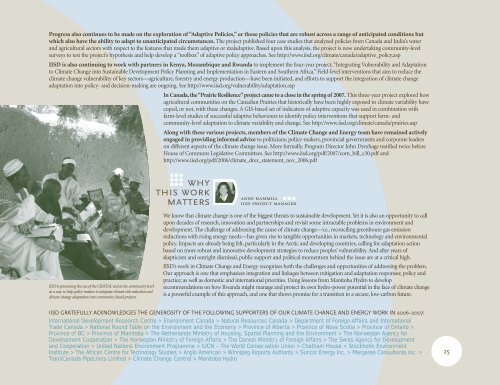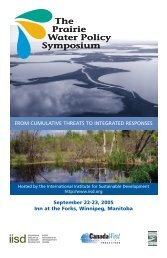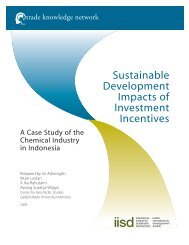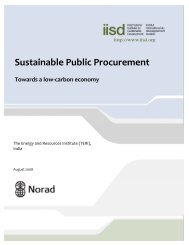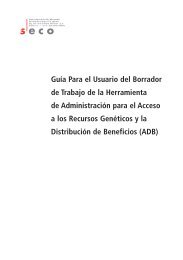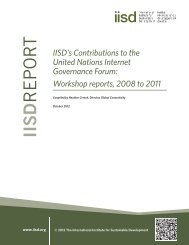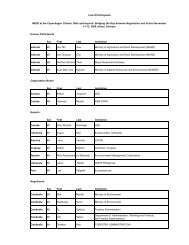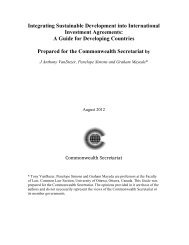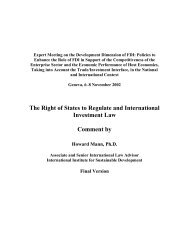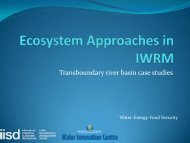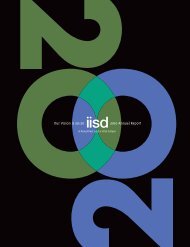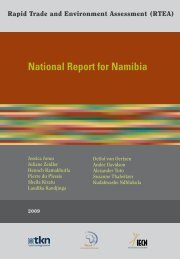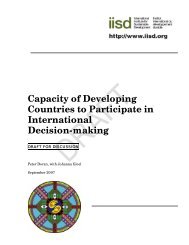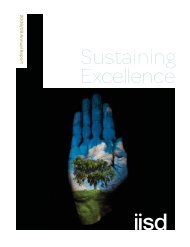2006/2007 Annual Report - International Institute for Sustainable ...
2006/2007 Annual Report - International Institute for Sustainable ...
2006/2007 Annual Report - International Institute for Sustainable ...
Create successful ePaper yourself
Turn your PDF publications into a flip-book with our unique Google optimized e-Paper software.
Progress also continues to be made on the exploration of “Adaptive Policies,” or those policies that are robust across a range of anticipated conditions but<br />
which also have the ability to adapt to unanticipated circumstances. The project published four case studies that analyzed policies from Canada and India’s water<br />
and agricultural sectors with respect to the features that made them adaptive or maladaptive. Based upon this analysis, the project is now undertaking community-level<br />
surveys to test the project’s hypothesis and help develop a “toolbox” of adaptive policy approaches. See http://www.iisd.org/climate/canada/adaptive_policy.asp<br />
IISD is also continuing to work with partners in Kenya, Mozambique and Rwanda to implement the four-year project, “Integrating Vulnerability and Adaptation<br />
to Climate Change into <strong>Sustainable</strong> Development Policy Planning and Implementation in Eastern and Southern Africa.” Field-level interventions that aim to reduce the<br />
climate change vulnerability of key sectors—agriculture, <strong>for</strong>estry and energy production—have been initiated, and ef<strong>for</strong>ts to support the integration of climate change<br />
adaptation into policy- and decision-making are ongoing. See http://www.iisd.org/vulnerability/adaptation.asp<br />
In Canada, the “Prairie Resilience” project came to a close in the spring of <strong>2007</strong>. This three-year project explored how<br />
agricultural communities on the Canadian Prairies that historically have been highly exposed to climate variability have<br />
coped, or not, with these changes. A GIS-based set of indicators of adaptive capacity was used in combination with<br />
farm-level studies of successful adaptive behaviours to identify policy interventions that support farm- and<br />
community-level adaptation to climate variability and change. See http://www.iisd.org/climate/canada/prairies.asp<br />
Along with these various projects, members of the Climate Change and Energy team have remained actively<br />
engaged in providing in<strong>for</strong>mal advice to politicians, policy-makers, provincial governments and corporate leaders<br />
on different aspects of the climate change issue. More <strong>for</strong>mally, Program Director John Drexhage testified twice be<strong>for</strong>e<br />
House of Commons Legislative Committees. See http://www.iisd.org/pdf/<strong>2007</strong>/com_bill_c30.pdf and<br />
http://www.iisd.org/pdf/<strong>2006</strong>/climate_drex_statement_nov_<strong>2006</strong>.pdf<br />
why<br />
this work<br />
matters<br />
anne hammill<br />
iisd project manager<br />
IISD is promoting the use of the CRiSTAL tool at the community level<br />
as a way to help policy-makers to integrate climate risk reduction and<br />
climate change adaptation into community-based projects.<br />
We know that climate change is one of the biggest threats to sustainable development. Yet it is also an opportunity to call<br />
upon decades of research, innovation and partnerships and revisit some intractable problems in environment and<br />
development. The challenge of addressing the cause of climate change—i.e., reconciling greenhouse gas emission<br />
reductions with rising energy needs—has given rise to tangible opportunities in markets, technology and environmental<br />
policy. Impacts are already being felt, particularly in the Arctic and developing countries, calling <strong>for</strong> adaptation action<br />
based on more robust and innovative development strategies to reduce peoples’ vulnerability. And after years of<br />
skepticism and outright dismissal, public support and political momentum behind the issue are at a critical high.<br />
IISD’s work in Climate Change and Energy recognizes both the challenges and opportunities of addressing the problem.<br />
Our approach is one that emphasizes integration and linkages between mitigation and adaptation responses; policy and<br />
practice; as well as domestic and international priorities. Using lessons from Manitoba Hydro to develop<br />
recommendations on how Rwanda might manage and protect its own hydro-power potential in the face of climate change<br />
is a powerful example of this approach, and one that shows promise <strong>for</strong> a transition to a secure, low-carbon future.<br />
IISD GRATEFULLY ACKNOWLEDGES THE GENEROSITY OF THE FOLLOWING SUPPORTERS OF OUR CLIMATE CHANGE AND ENERGY WORK IN <strong>2006</strong>–<strong>2007</strong>:<br />
<strong>International</strong> Development Research Centre > Environment Canada > Natural Resources Canada > Department of Foreign Affairs and <strong>International</strong><br />
Trade Canada > National Round Table on the Environment and the Economy > Province of Alberta > Province of Nova Scotia > Province of Ontario ><br />
Province of BC > Province of Manitoba > The Netherlands Ministry of Housing, Spatial Planning and the Environment > The Norwegian Agency <strong>for</strong><br />
Development Cooperation > The Norwegian Ministry of Foreign Affairs > The Danish Ministry of Foreign Affairs > The Swiss Agency <strong>for</strong> Development<br />
and Cooperation > United Nations Environment Programme > IUCN – The World Conservation Union > Chatham House > Stockholm Environment<br />
<strong>Institute</strong> > The African Centre <strong>for</strong> Technology Studies > Anglo American > Winnipeg Airports Authority > Suncor Energy Inc. > Margaree Consultants Inc. ><br />
TransCanada PipeLines Limited > Climate Change Central > Manitoba Hydro<br />
25


